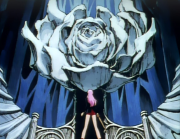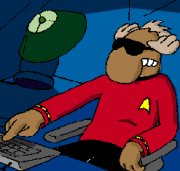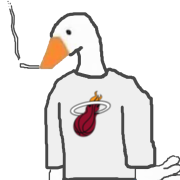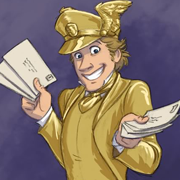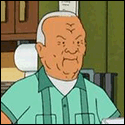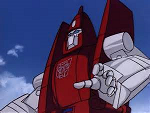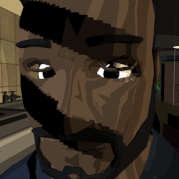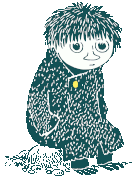|
GoutPatrol posted:It was a several steps below the show. Considering it was 15 years later and part of the promotion for the film was "Milch has early signs of Alzheimer's, this is the last thing he's ever gonna do" it was not terrible. oh jesus, yeah I came to deadwood long after the movie came out and loved the series, but didn’t have to grapple with the sudden cancellation and then the long wait and apparently terrible news. that sucks but kind of explains a lot.
|
|
|
|

|
| # ? Apr 27, 2024 00:04 |
|
Jerusalem, before this thread drops out of sight and mind, I hope you'll give us some responses to some of the spoilered reactions and discussions from earlier in the thread. 
|
|
|
|
Things have been pretty busy but I'm gonna put together a season 7 retrospective (kind of fascinating how the split creates two very distinct "seasons" but I don't feel like they can really be separated, each informs the other in interesting ways) this weekend, and then try to gather my thoughts to break down my overall feelings about the show as a whole. Then yeah, a lot of reading the CIA notes throughout the thread!
|
|
|
|
On a tenuously tangential note, I watched Confess, Fletch. I enjoyed it a lot. Seeing Hamm and Slattery drinking together again was cool, but with very different energy. Hamm doesn't try to do Chevy Chase, thankfully.
|
|
|
|
|
I saw an article about it in the rolling Stone, summarized as "yeah it's good but it got no press because superheroes"
|
|
|
|
They shoulda put it in theatres. I woulda seen it
|
|
|
|
Gaius Marius posted:They shoulda put it in theatres. They did a whopping 242 of them
|
|
|
|
Confess Fletch is one of the rare ones where I didn't mind seeing it at home because it almost had a vibe that was closer to a really good TV pilot. But yeah, a very breezy and fun watch
|
|
|
|
Oh wow, that sounds extremely my jam, I read the book a long rear end time ago and it sounds like a perfect Saturday afternoon/evening movie. Literally never heard it existed until these posts, wow.
|
|
|
|
Harrow posted:I have a question for the Mad Men thread. What shows would you recommend in terms of like "if you loved Mad Men, you should watch _______"? There are some obvious answers (The Sopranos, Breaking Bad, Better Call Saul) but I'm wondering what other shows people would recommend. Bojack Horseman. While it doesn't seem like an obvious jump, it scratched a lot of the same thematic itches for me. KellHound fucked around with this message at 20:41 on Oct 1, 2022 |
|
|
|
KellHound posted:Bojack Horseman. While it doesn't seem like an obvious jump, it scratched a lot of the same thematic itches for me. Oh yeah, good call. The connection that jumps out for me is how both shows (very mild thematic spoilers for Bojack, I guess?) trace the trauma that the main characters experience as children into how they function (or malfunction) as adults. Bojack goes a step further and explores how trauma gets passed through generations, especially through the excellent "The Old Sugarman Place" and "Time's Arrow" episodes.
|
|
|
|
its no surprise that raphael bob-waksberg put mad men as his second place pick for best shows of all time with no joke text https://twitter.com/sepinwall/status/1575934578606235648
|
|
|
|
tag yrself im Party Down (Disregard if new season is bad)
|
|
|
|
the comeback is a loving amazing show though that doesn't get enough credit, glad to see it at #3
|
|
|
|
Paper Lion posted:its no surprise that raphael bob-waksberg put mad men as his second place pick for best shows of all time with no joke text I saw this ballot yesterday and lol'd while reading it, it's so good Rolling Stone should've just posted this as their list ram dass in hell posted:tag yrself im Party Down (Disregard if new season is bad) I'm "Community and Parks and Recreation and The Office and 30 Rock ALL ON THE SAME NIGHT??!?!?"
|
|
|
|
ram dass in hell posted:tag yrself im Party Down (Disregard if new season is bad) "Old reruns and syndicated game shows when you're home sick from school and you're in the TV room with a blanket and bucket to throw up into and your parents are both at work, you've got the whole day to yourself, and already you're feeling a little bit better" 
|
|
|
|
ram dass in hell posted:tag yrself im Party Down (Disregard if new season is bad) I'm Frasier minus the fat jokes
|
|
|
|
I started watching Reboot on Hulu and instantly felt like I was watching a pale imitation of Bojack Horseman, rendered more formulaic and stripped of all pathos or insight. Tonally or atmospherically, BH is not like Mad Men at all. But wow does it manage to nail the same sense of ennui and inner rot experienced by successful people who’ve never confronted their trauma. And bonus points for being shockingly honest in its treatment of mental illness. This cartoon about the alcoholic horse has no business being so good.
|
|
|
|
ram dass in hell posted:tag yrself im Party Down (Disregard if new season is bad) i'm Conan O'Brien During The Writers' Strike
|
|
|
|
I'm mad men
|
|
|
|
Season 7 Retrospective When first thinking about the final season of Mad Men, it's easy to consider the "split" season as an example of a studio trying to "double dip" by breaking one long season into two smaller ones. That's essentially what happened to The Sopranos, but while I'm sure AMC was happy to get another year of Mad Men, I do think the split helps effectively convey what I felt was the core idea of the 7th Season and arguably the show as a whole. You don't always know what you want. It's remarkable, with the benefit of hindsight, to look back on that first half of season 7 and marvel at just how utterly inconsequential much of what the core characters - particularly Don - were concerned about, knowing what would come in the second half of the season. But that's also a deliberate choice, I feel, or at the very least a happy accident. Because the fact these things were ultimately inconsequential IS important and help make that final episode land so strongly. These characters had become so wrapped up in all the wrong things, so focused on what they thought they SHOULD care about, that it took a seismic shift in their environment to make them grasp that what they were scrabbling to keep or to achieve was ultimately not going to bring them satisfaction.       The driving force of the first half of the season is Don's attempts to return to SC&P. Unceremoniously sent "on leave" at the end of Season 6, Don's pursuit of a return is maddening because unlike some of the other characters we've already seen that what he "wants" is absolutely NOT what he wants. For six seasons we saw him flail about for something to fill the hole inside of himself: sometimes it was his work, sometimes his family, sometimes his marriage, sometimes his mistresses. But we KNEW that none of those things would bring him relief. At the end of season 6, he's enthusiastically found yet another variation of his old "I can be happy in California!" fantasy, convincing Megan to give up her career success in her chosen field for them to make a new start and hopefully reignite the dying flames of their marriage. But once leaving New York is no longer HIS choice, the front half of season 7 is all about Don ignoring that he has multiple options for a happy ending that he himself has actively pursued in the past. And for what? Because it's one thing for Don Draper to walk (run) away from something, and quite another to have it cut off from him - see his initial reaction to Betty's demand for a divorce, despite his own prior attempts to simply abandon the marriage. It hurts his ego, and it is incredibly frustrating to watch as he burns all those other obvious and frankly far more enticing avenues to get back to a pale imitation of what he once had. But Don isn't alone. Peggy Olson - who ends most seasons in somewhat of a state of satisfaction after a bumpy road - finds herself facing an uncertainty that may not plague her male peers for at least another couple of decades. She's past 30, not in any kind of relationship, and even the career that she chose to focus on appears to have hit a dead-end. Ted got a conscience only AFTER he slept with her, useless old "adequate" Lou replaced her in the temporary Creative Director role she though she could make her own after Don's forced leave, and now the work she used to feel support and interest in just slams against a wall of old, white male mediocrity. Across the course of the half-season, she regains her mojo, ending with an astonishing pitch that stuns even Don Draper, which sets her up nicely for the shift in the back half of the season, because of course her career success has not brought her satisfaction in those other areas of her life where she was feeling inadequate.... just temporarily quelled her gnawing self-doubt. There's Megan, trying to rebuild a career in quiet desperation and also save a marriage she is smart enough to see is doomed so long as Don can't accept that they're a partnership. She clearly resents the emotional connection Don has with Stephanie that he doesn't seem to have with her, and her efforts to entice him with sexual fantasies come true just further highlights her desperation to save something already dead. Much of what we see of Megan in that first half of the season is a woman who is slowly coming to terms with the fact that what she thought she wanted isn't going to happen, and the uneasy understanding that she is going to have to move on first because Don still thinks he can have everything on his own terms even if having one actively hurts the other. See how he avoids any kind of suggestion that he move to California now that he's completely free to do so, and yet when life is getting somewhat back to normal for him at SC&P he starts pushing for her to return to New York. There's Roger, his dalliance with Acid and therapy causing him to explore an "open mind" in decidedly Roger fashion: via hedonistic "free love" that brings him no real joy. He is forced to confront his failures as a husband and a father, the lack of true respect of his peers for his business acumen or leadership skills, and the growing realization that he has been outflanked by Jim Cutler without even realizing they were at war. This is turn leads him to pour everything he has into winning that fight, even though the man whose respect he truly wanted all along died without ever giving it to him.... another father who exists now only as a larger-than-life figure in his memory, whose shadow he can't ever truly escape, who he can never actually prove himself to because he's chasing a memory.     I could go on - Ginsberg, Sally, Betty, Henry, Pete, Ted, Stan, Bob.... hell even Bobby! Only two exceptions really stand out as not caught up in hunting for the wrong thing, and they couldn't be more opposite: Harry Crane and Joan Harris. Harry's regression as a person is its own sort of wonderful character "growth". Long gone is the man who wept in despair at violating his marital vows, whose ultimate lesson from his dalliance was that he had been unnecessarily "restricting" himself. His success is obvious, but he also shows no desire, interest or capacity for growth beyond increasing the circle of low level power in the Film and Television adjacent circles he sleazes his way through. It's easy to look now at his season 1 eagerness to let women know he was married as his way of removing temptation from his path, because on some level he seemed to know that if temptation was there, he WOULD take it... and the only difference now is that he isn't remotely troubled by it unless it might blow back on him in some way. He has no values beyond his own gratification, has no backbone or moral stance, aiding Don Draper and Jim Cutler in equal measure, brown-nosing everybody including Roger who has no time for him, having no issue with throwing his support behind whoever he thinks will materially benefit him the most, meaning that even those who respect his talent dislike him as a person. That the only Partner he ever openly talks poo poo to is Joan tells us a lot about him and his opinion on women, as well as the immediate attempt he makes to "seduce" Megan during their business meeting. Joan herself, despite lingering and understandable resentment towards Don, spends the entire first half of the season figuring out what she really wanted all this time, a trend that continues after a momentary dip through the second half of the season. Always understood to be hyper-competent and a little terrifying by the men she works with even at Sterling Cooper's most misogynistic, Joan comes into her own as she takes an opportunity, pushes past the initial resistance, and quickly discovers that she is not only talented as an Account Man, but that she'll be accepted by even those who initially resisted her joining their ranks. Harry once accused Joan of having done nothing to earn her Partnership, a crude jab at the deeply revolting position she was put into by Pete but also all the other Partners aside from Don. After a brief opening stumble, what Joan learns in the first half of season 7 is that she's more than capable of doing what these men do, that her input and insight is valued, that she has skills and talent and is even more of an asset than she already was (don't forget, the Sterling Cooper heist would have NEVER worked without her). Cutler pushing for her to set aside her Office Management role in favor of Accounts was in service to his own goals too, but - ironically, like he did with Harry - he genuinely saw the added value she could bring to SC&P. When Richard comes into her life, it's one last reminder of what for much of the show she thought she was SUPPOSED to want in the previous seasons: a rich man who could let her live a life of luxury and ease. Instead she actively chose to continue to run her own business, to be her own Boss, in work and in life. Harry chased a sleazy dream of Hollywood and casual sex with naive wannabe starlets. Joan learned she was as capable if not more at leading as the men she'd worked under for well over a decade. Both stand apart in this season as the characters who not only know what they want when the season starts, but are still pursuing some version of that same goal when it finishes. What does Harry aspire to be? A hanger-on leeching off people of influence and peddling in the reflected glory that comes with it. What does Joan aspire to be? A person of influence.   But that's getting into the back half of the season, and before I do, let's talk about Jim Cutler. Specifically, Cutler's war with Don (and to a lesser extent, Roger). For half a season, it is THE driving force of the drama at SC&P. Cutler is taking out resentment on Don regarding Ted, true, but he's also trying (and seems to be pulling it off!) in being the more successful version of Duck Philips. Cutler, an amoral, voyeuristic lech who dishes out amphetamines as a productivity booster, is following the Duck game-plan of precision targeted, data-driven advertising at the expense of creativity. In a not too subtle bit of writing, he has the Creative Lounge torn out in favor of a big Computer. His endorsement of Lou as Creative Director is that he is "adequate". He turns up his nose at the idea of personalities getting more focus than cold, hard numbers. He tosses aside the "moral" decision (forced on the Agency by Don) to not work with Tobacco firms. He offers Harry Crane a Partnership solely on the idea that they can sell data-driven marketing and media "expertise" as the selling point of the Agency over Creativity. Much of this first half of the season is devoted to he and Don outmaneuvering around each other in an effort to stymie the other, Don trying to force his way back in and take the leading role pushing Creative-led work over Cutler trying to remove Don entirely and make it solely a business. Battle lines are drawn, uneasy alliances made, there is an ebb and flow as one or the other oversteps and loses (temporarily) the support of the other Partners. Cutler is ruthless and pragmatic, barely letting Cooper's corpse cool before declaring now they have the numbers to vote out Don. Don throws together Hail Mary plays to try and force his way back into power, ambushing the Commander Cigarettes meeting, forcing votes in public where Partners have to look him in the eye if they want to "betray" him etc. And it all means absolutely nothing. All that investment, that energy, Don ruining yet another marriage, the humiliations and setbacks and planning and plotting and scheming.... none of it matters at all. Well... I mean, yes it matters, it has enormous implications for what happens in the back half of season 7! But the ACTUAL thing they're fighting so passionately over? It's gone by the halfway point of the second part of Season 7, and Cutler himself is gone entirely from that back half. He barely gets a mention in those last few episodes outside of an acknowledgement that he smartly got his share of the money and made a dignified exit while the rest were stuck with McCann-Erickson. All Don's machinations, all his efforts, all the things he cost himself on the way as he tore himself up, buried himself first in booze and then in work.... swept aside in an instant with barely a thought, by a man who genuinely thought he was making all their dreams come true because he couldn't comprehend anybody having any other dream than his own. That's important, because it leads to the kind of seismic shift mentioned earlier - particularly for Don - for characters to start taking stock and thinking about what they REALLY want from their lives and careers. Everything up to that point, all the things that the characters felt so deeply about, were so invested in, all got blown away... and all because an old multi-millionaire never got over being rejected back in season 1 when he tried to bribe Don away from Sterling Cooper.   When the second half of the season starts, there's a sense that in the intervening time SC&P had their guard up but have started to relax. Don is firmly back where he (thought he) wanted to be, Roger is delighted to have his old drinking buddy back without any of the restrictions that were on them before AND now he's fully the man in charge without Cutler or Cooper hovering overhead. Peggy, still feeling the lack of romance in her life, gets the thrill of a passionate date (aided by drunkenness) and almost a flash of spontaneity. Pete refers to his California life as something out of a dream quickly fading as he nestles solidly back into New York. Joan feels professionally valued and satisfied. Harry is Harry. Everything seems largely back to normal, or to have settled comfortably into a new status quo. Ted is back from California, his marriage over but the man himself seemingly content to coast along as a Partner of the now McCann majority-owned SC&P. He missed his shot with Peggy, but each seems to have largely moved past the bitterness of their disastrous and short-lived affair. Don cleans up the detritus of the doomed months he spent alone in New York, finalizing his divorce from Megan and seeming to meet a new romantic interest, even showing a newfound openness about his past that indicates he may have learned some hard-earned lessons from the issues he caused with Sally and yes also SC&P. But the signs are already there early, not just in terms of Don's personal life but what is happening professionally at SC&P as well. For a hands-off owner, McCann doesn't mind throwing their weight around Roger - supposedly the "Boss" now - puts up no fight at all, casually firing Ken Cosgrove seemingly without hesitation. Roger is instructed not only to attend conferences but given homework to boot, none of them picking up on the fact their "vision for the future" is simply a way of telling McCann where to place the key personal from SC&P when they absorb them. The aforementioned "homework" is where Don does start to realize that, of course, getting back to the same position he held and was willing to give up until it was taken from him isn't actually bringing him satisfaction. He quizzes other on what THEIR goals and aspirations are, seemingly criticizing them but really acknowledging that he doesn't feel motivated or excited by what the future of advertising might hold for him. His divorce may be complete, but his romance is dead, as new love interest Diana disappears as quickly as she first appeared, a mystery box that Don NEVER gets to solve... but which was itself simply another distraction as he sought meaning in somebody, something, some how, ANYTHING! It's slightly before the drama of the absorption, but we also see the start of a process Don will undertake across the remainder of the season. When Marie strips out almost everything from his apartment as part of a petty "revenge" on behalf of her daughter (who has no interest in any such thing), Don discovers that he has no desire to redecorate and fill the place up with the stuff that supposedly makes a house a home. He resists efforts to even rent furniture to help sell the apartment, and leaves the decoration of both his new McCann office and his new apartment to Meredith, happy to live in somebody else's idea of what a home should look like because he - bastard son raised by a poverty stricken woman in a farm before spending his adolescent years in a whorehouse - really doesn't know what that will be. When Roger admits that they're to be absorbed by McCann, his interest is roused at last, but not by the prospect of working there, but by the excitement of pouring his energy into yet another trademark Don Draper last second escape. Here's a chance to redo the escape from Sterling Cooper! The merger of SCDP & CGC! The end-play to outflank Jim Cutler! Here it is again, a chance to start afresh in the same California he just spent the front half of the season resisting moving to! Sterling Cooper West, the answer to all of his problems for a couple of months! Because Don doesn't know what he wants, he only knows that what he currently has isn't it, even when he thought it would be, but that there must be something that can give him the peace and satisfaction he can't seem to find anywhere, at least not in a way that lasts. So he pitches Sterling Cooper West, and in all honesty they probably could have just made it work as a way to end the series if they didn't want Don to ever truly come to terms with himself.... but thankfully they did. Jim Hobart cuts him off before he can even really start to make his pitch, because Jim Hobart also thinks he knows what he wants, and he's rich and powerful enough that he can force that reality in a way that the (also wealthy!) Don Draper cannot.     Nobody wants to leave SC&P for McCann, outside of Harry Crane (and the comfortable indifference of Ted Chaough), because despite its size and prestige it is not THEIR home, THEIR Agency, the place that THEY built. But what they had built is already dead, it died when they sold 51% to McCann, and that is made clear when they announce the absorption and try to put a positive spin on it only to be ignored by the SC&P "family" who now have to worry about a lot more than their dejected but still VERY wealthy Bosses. These seismic shifts in a person's life give some a chance for perspective though, a perspective that perhaps would never have come if something hadn't shaken them out of their comfort zone. For all his pride in being a cosmopolitan New Yorker, Pete would have happily worked and died at the good-sized but still rather boutique SC&P just because he had no idea if he could really make it outside of it, as shown by his declining multiple job offers in the past even when unhappy at his work. For him, Sterling Cooper, SCDP and SC&P were always the same place at the core, but his success at McCann, brief though it was, let him see beyond his boundaries. He took the job with Learjet, but more than that he took the chance to try and go back and fix perhaps the worst mistake he ever made, reuniting with Trudy - the wife he never truly appreciated after the honeymoon phase - and his daughter Tammy to make a truly fresh start in life, not just a relocation within the same Agency to California. Stan, seemingly so full of bluster and confidence when we first met him, fears that his art skills will carry him only so far as photography becomes more and more accessible, and his own skills in that area are nothing special. It's Peggy who assures him that he can make it at McCann, even as she - like Pete - faces the uncomfortable pressure of leaving the place that, some bad dips aside, has been like a home to her and saw her develop into the professional AND the person she is today. She actually faces two tests of that resolve, swallowing the bitter pill of taking the Consultant's advice to treat the next few years of her life at McCann as a necessary evil to further her own career... and then making the decision to stay when Joan offers her a chance to escape and throw herself into doing her own thing again. What does Peggy want? She wants to succeed, and the season ends much as many other seasons have, with Peggy feeling professionally and personally fulfilled, having come through a tough time with fresh resolve. Her romance with Stan, seemingly sudden because it crept up on EVERYBODY so gently and non-(TV)traditionally, another sign that she is right where she needs to be... for now. And that "for now" is all right too, she's seemingly stopped worrying about where she SHOULD be at any given point, and is now proceeding ahead knowing that wherever she is, that's where she needs to be for that time. Roger, his leadership status removed as McCann devours them as feared, finds himself back to wondering just what to do with this life. Retreat back into hedonism? Drink himself to an early grave? Allow himself to be relegated to a dusty senior role where he's paid well but does little? Earlier season versions of Roger would have pretended to be happy to just drink, do drugs, and gently caress without even the token responsibilities he had at his Agency. This Roger though keeps the work ethic he found so late in life, ending the series busier than he's ever been... but also marrying an older woman with actual life experience rather than the mid-life crisis that was Jane, finding somebody as acerbic and witty as himself, somebody with culture and stories of her own to tell. What did Roger want? Not the simple answer of his devotion to pleasuring himself, but to be challenged and to prove himself worthy to rise to that challenge. He wanted a legacy, and he has it in both a grandson and a not-officially recognized son, even if he ruined things with his daughter. Will he and Marie last? Who can really say. Will he become a key player in McCann? He's already shown he hasn't lost the fearlessness he felt towards Jim Hobart when they were "peers" as Presidents of their respective Agencies. His family name may not live on but his bloodline will, and the mother of at least one of his descendants will cherish her memories of him. The future looks fairly rosy to Roger, which isn't new, but for once it actually feels like he might deserve it. Ted, not as nice as he'd like to appear, but not cruel, simply goes with the flow. He started the season trying desperately to save his marriage in California, but while his wife and children loved it there, he did not. He lost everything: his marriage, his mistress, regular access to his kids, his passion for his work. But in losing those things, in stripping away what he had, he found the bliss of simply letting things happen to him instead of trying to make them happen. He found an old College flame, they rekindled their romance, and while that may or may not go anywhere, you get the sense that Ted is happy to take it as it comes, no matter what they may be. What did Ted want? To just sit back and be a passenger enjoying the ride that is his own life.     It's not universal, the exceptions like Joan and Harry are mentioned, or there are the likes of Ken who gets offered exactly what he REALLY wants and turns it down to relish in spite and a very successful but very stressful job working for a company he knows is making the world a worse place. There's Shirley and Dawn, characters we saw only briefly and spottily across the run of the show, and it perhaps says it all that while SC&P was far from perfect, Shirley at least beat a quick retreat from the world of advertising rather than face the likely horrific experience she'd have at McCann. I don't know if there was an external reason for Dawn's seemingly budding story-line as the new Office Manager following Joan's promotion to largely fall by the wayside, but they offered an intriguing view into characters who not only had to deal with prejudice for being women, but for being black to boot. It's not all SC&P of course, Megan was mentioned above but there's also Betty and Sally in particular as characters navigating themselves through massive changes in just this season, let alone across the series as a whole. Sally starts the season justifiably disgusted with her father but making stuttering steps to try and reconnect with him in some capacity, aided by his choice to show them his adolescent home and his increasing willingness to talk to her like an adult. Their regular talks by the end of the season demonstrate a growing closeness between them that isn't as pure as the simply adoration she once had for him but is the hard earned result of coming to grips with each other as actual people and not just the simplistic roles of father and daughter. It's the relationship with her mother that gives us the most traction though, as her sometimes performative disdain is washed away by the horror of realizing her mother is going to die, and she tries to reconcile her conflicting feelings of anger and love with a woman she knows is still extremely flawed but is also HER MOTHER. Even here she retains some of her rebelliousness, ignoring Betty's insistence she live her life as normal to reduce the "drama" in the household, returning from Miss Porter's to look after the boys and help around the house as Betty becomes increasingly unable to perform these tasks. Sally once childishly proclaimed she'd love it if her mother died, that all she wanted was to get somewhere far away from either her or Don. By the end of the season, she's set that childishness behind, willing and capable of facing head on the rough and unpleasant reality of what little time they have left. For Betty it's not so simple. The first half of the season runs with things much as they have been for her in previous seasons: life is perfect but she can't understand why she's not happy. Her and Henry argue over politics of all things, or rather the fact that he doesn't want or seem to think she can comprehend them. She takes childish mistakes like Bobby trading away the "extra" sandwich on a field trip for candy as an intended slight by a vile child who wanted her to know he hates her. But she also starts to work on improving herself, no longer satisfied with the simply housewife role she once assumed was the be-all and end-all for any woman. Much like divorce was once unthinkable, continuing her education now becomes a priority. It was once thing to dabble with the potential of returning to modeling as she did in season 1, but college is a whole other matter, and psychology an example of the growth of that science from the appalling experience she had in season one through her unsubtle efforts to get therapy by proxy with Sally's child therapist. Her cancer diagnosis throws her entire life and the way she has lived it into sharp relief. Her decision to forego treatment and continue life as if it was normal isn't just stubbornly trying to pretend the cancer isn't there, but to make the absolute most of her last days and pursue the things that interested her not just with a goal in mind, but to simply do them. "Why was I ever doing it at all?" she asks Henry, and she isn't asking herself that question, she's making a statement that she chose to be educated simply for the sake of being educated, for the joy of learning things, for using her mind. She does have opinions, she does have ideas, and by 1970 she was long past the housewife in 1960 who was content to let her husband make all the major decisions in their life. What did Betty want? She wanted to be free of limits both imposed and self-imposed on her. In that respect, mother and daughter are very much alike, and it's no wonder they clashed so much as Sally got older and kicked back against perhaps the only real authority Betty had ever actually had.   But as always, it all comes back to Don Draper. The sun that this entire show revolves around. Though the show has a spectacular ensemble cast full of memorable characters, it is Don at the center of it all, and the back half of the season and the back half of THAT back half strip him down and deconstruct him to an astonishing degree. Mentioned earlier, the baring of his apartment is the first sign of Don shedding his baggage. After his Sterling Cooper West gambit fails, he barely lasts any time at all before the realization that he's just one of a number of identical cogs in a giant machine overwhelms in. It doesn't matter that Jim Hobart drools over him, because even his #1 fan simply intends to jam him into the shape he thinks best. So Don does what he always does... he runs away. But this time, instead of fleeing to California and Anna (certainly not Megan) or returning to his old home, he simply... drives. At first he tries to find Diana, one last attempt to set a goal he can use to distract him from his depression and anxiety in the lunatic belief that finding her will somehow set everything to rights. When that fails spectacularly, he simply drives, and drives, and drives and drives. He carries barely any luggage, he takes in the sights, he gives not a second thought to work (or poor Meredith), but notably he DOES maintain a link to the children he has been so willing to set aside in the past (as Betty coldly reminds him when he tries to insist they will live with him when she is dead). It's not a conscious choice, but Don is searching for meaning while also setting aside everything that did not work for him. What does Don want? He doesn't know, he just knows he hasn't found it yet, and so he keeps searching. He criss-crosses America, he drives fast cars, he drinks and he reads books and he drives. The only luggage he has he carries in a Sears bag, including cash and IDs that are real but still based in a name that he stole from a corpse in Korea. And that fact, that millstone around his neck, FINALLY gets a resolution of a sort, as he uneasily attends a Legion Hall fundraiser and meets with other veterans where in a drunken moment egged on by the confessions of others, he admits that he inadvertently caused the death of his CO. They accept him regardless, acknowledging a truth they all know: that everybody in war does what they have to do in order to survive. Confessing the truth out loud releases an enormous amount of pent up pressure in Don, but it's also something he's done before.... it's what comes next that proves truly cathartic. Mistaken for a thief by the veterans after a local robs the fundraising cash, they restrain Don in his room and beat him with a phone book. Don, saving the dumb kid from being caught and getting blackballed by his own hometown, returns the cash on his behalf and accepts the blame. Why is that important? Because Don was performing a penance, taking a beating for the theft he DID commit: he stole Don Draper's name and the life that he inadvertently ended. It doesn't matter that Anna gave him her blessing, or that Pete and Betty were willing to keep quiet, or that Megan accepted this dark truth about him. Because he never suffered for it, outside of the internal torment he felt. The beating is a catharsis, and he further strips away from himself by giving the dumb kid, Andy, his car. It's gradual process, most of it happening subconsciously. But when he learns from Sally that Betty is dying, and when she rejects his push to take the kids when she dies (and poor Henry is apparently to be left with nothing, despite raising them as his own) it drives him to seek the closest thing to Anna there is left in the world. It's Stephanie's issues that lead him to the Retreat, it's Stephanie's sobbing escape from being confronted over giving up her child that causes him to completely fall apart. It's that falling apart that leads him to meekly attending a session where he listens in stunned awe to a completely ordinary man reveal that he feels exactly the same emptiness and invisibility that he himself feels. Forever shrouded by his cloak of perfect handsome virility, an award winning Creative and a millionaire, Don Draper seems the furthest thing from a man who feels unloved, unwanted, and ultimately unneeded. What does Don Draper want? He wanted to feel loved. Understood. To share everything with a partner who shared everything back, who truly KNEW him as he truly KNEW them. He wanted human connection, something denied to him by a drunken father and a stern step-mother who loathed his very existence. He wanted love, something he only ever got to see as a commodity traded by women who took money in exchange for granting men their fantasies. It is no wonder Don Draper found advertising, or that even in his moment of pure oneness and bliss with the world it seems it proved inspiration to make yet another commercial. Because Don Draper learned from a young age that people paid for what they wanted, and that there was nothing wrong with selling it to them, that this in fact gave you purpose where you might not otherwise have any. How does Don Draper end season 7? He finally found the happiness and contentment he was searching for, he finally felt whole... and he wanted to share that feeling with the world. How he chose to do it is irrelevant, the important thing is that he wanted to share it at all. Something he had been scrambling after his whole life, and when he finally found it, he didn't hoard it, he tried to help others feel the same. https://i.imgur.com/rPmQmO3.mp4 It took me two years, but after 7 seasons, 92 episodes, a shitload of written words, and cursing myself all the while for taking so long to watch it.... I can confidently say that Mad Men was one of the greatest television shows I have ever seen. Episode Index Season Seven: Time Zones | A Day's Work | Field Trip | The Monolith | The Runaways | The Strategy | Waterloo | Severance | New Business | The Forecast | Time & Life | Lost Horizon | The Milk and Honey Route | Person to Person | Season 7 Retrospective Jerusalem fucked around with this message at 12:49 on Oct 2, 2022 |
|
|
|
Jeru, you're the best. No idea what you're doing next, but I will def watch along
|
|
|
|
yeah if you could provide a link to your next let's watch that would be great. I don't go in tviv that often. Actually I don't go on tviv ever lol, except to read this thread
|
|
|
|
Thank you, and yes I will do. Things are very, very busy at the moment so it's likely to be awhile, and I still wanna make my way through the discussion that was so courteously spoiler-tagged. Also, I'm surely not the only one who sometimes goes back to look at season 1 of the show and marvel over the fact they're all babies, right?
|
|
|
|
you should definitely quote the spoiler posts so you can laugh at their 2 year old takes
|
|
|
|
Jerusalem posted:Also, I'm surely not the only one who sometimes goes back to look at season 1 of the show and marvel over the fact they're all babies, right? There are a lot of stories out there about how Vincent Kartheiser is a nightmare to work with, but I've gotta respect the guy's commitment to the craft. Putting on just enough weight season-to-season and shaving back his hairline to make Pete Campbell's entry into middle age look natural. (Always funny to see a photo of him between seasons, where he's not maintaining the look and has the Wardlow Double Hairline thing going. Half an inch of peachfuzz before an immediate transition to long, luxurious locks.)
|
|
|
|
"I don't often visit TVIV, but when I do, it's to read Jerusalem."
|
|
|
|
hey, i really loved that season 7 write-up and retrospective. it was really sweet and well thought out and good. it's so funny that a lot of these characters are at best "decent" people, but we've grown to love them all the same from our time and the deep humanity the show gave them. unsure what else to add. it is a unique and damning look at the America of the 1960's too, and ending on such a hopeful note while America was headed straight down its darkest period is definitely an intentional contrast that i like a lot. i've always rooted for don because fundamentally he really does just want to be loved, and throughout the series you really do see selfless acts he does "by default". so seeing him..maybe get past some of his trauma, maybe move on, is fulfilling.
|
|
|
|
drat can you elaborate a bit on how the 1970s were worse than slavery, manifest destiny, civil war, etc I mean the 1970s on haven't been great but
|
|
|
|
ram dass in hell posted:drat can you elaborate a bit on how the 1970s were worse than slavery, manifest destiny, civil war, etc Shag carpets
|
|
|
|
OctaviusBeaver posted:Shag carpets In bathrooms and toilets.
|
|
|
|
ram dass in hell posted:drat can you elaborate a bit on how the 1970s were worse than slavery, manifest destiny, civil war, etc lol you’re right that was a poor choice of words. I was more emphasizing how rapidly the 70s to present abandoned the pretense at social democracy and social mobility in favor of unprecedented mass incarceration and slavery, constant low level violence against minority communities, etc., but yes you’re right things were worse in the 19th century and really parts of the 20th century even so. I was more trying to highlight the disparity of the next decades to the decade mad men highlighted. apologies for my bad communication there
|
|
|
|
Waifu Radia posted:how rapidly the 70s to present abandoned the pretense at social democracy and social mobility in favor of unprecedented ...slavery, constant low level violence against minority communities, etc., but yes you’re right things were worse in the 19th century and really parts of the 20th century even so. I was more trying to highlight the disparity of the next decades to the decade mad men highlighted. apologies for my bad communication there Yeah unprecedented levels of slavery is not something I'd say about 1980s America.
|
|
|
|
I've always taken Don's final moment leading into the Coke ad as him yeah, finding a moment of relief from trying to fill the suit and hole inside him, but then the show cuts straight to the famous commercial. I think after the moment passed, he used the memory of it as fuel to continue on the same path, which has been darkening for a long time. So I don't think Don's life is a happy one from here on out, because he hasn't actually learned anything if that was what he did with this experience. It was just a catharsis that didn't last. He goes back to New York and cannibalises his own emotional depth for the sake of materialism, as he always has throughout the show. I see it as a microcosm of what happened to the counter cultural movement of the 60's - subsumed into the pursuit of wealth. So it works for me on both of those levels. A failure to learn from pain, and cynical exploitation of those who are still hopeful.
roomtone fucked around with this message at 06:08 on Nov 2, 2022 |
|
|
|
sebmojo posted:Yeah unprecedented levels of slavery is not something I'd say about 1980s America. MY WORD CHOICE IS BAD you all know what i mean ahhhh im going to go cry in a corner
|
|
|
|
the great thing about mad men as a whole is that while the writers certainly have an agenda, the characters are written and portrayed with such realism and honesty, you can take away something different and have it be just as supported by the work as someone else's entirely different take. I can see both the cynical reading of the ending as well as the hopeful one. in truth, the ending is a litmus test for the viewer, not the show.
|
|
|
|
roomtone posted:I've always taken Don's final moment leading into the Coke ad as him yeah, finding a moment of relief from trying to fill the suit and hole inside him, but then the show cuts straight to the famous commercial. I think after the moment passed, he used the memory of it as fuel to continue on the same path, which has been darkening for a long time. So I don't think Don's life is a happy one from here on out, because he hasn't actually learned anything if that was what he did with this experience. It was just a catharsis that didn't last. He goes back to New York and cannibalises his own emotional depth for the sake of materialism, as he always has throughout the show. I see it as a microcosm of what happened to the counter cultural movement of the 60's - subsumed into the pursuit of wealth. So it works for me on both of those levels. A failure to learn from pain, and cynical exploitation of those who are still hopeful. Yeah this is how I always viewed it. He probably wasn’t the first person to reconstitute his childhood trauma into a cynical corporate export, but I like to imagine that he’s the model used by so many today.
|
|
|
|
this show owns
|
|
|
|
Waifu Radia posted:this show owns A thing like that!
|
|
|
|

|
| # ? Apr 27, 2024 00:04 |
|
JethroMcB posted:A thing like that!
|
|
|



